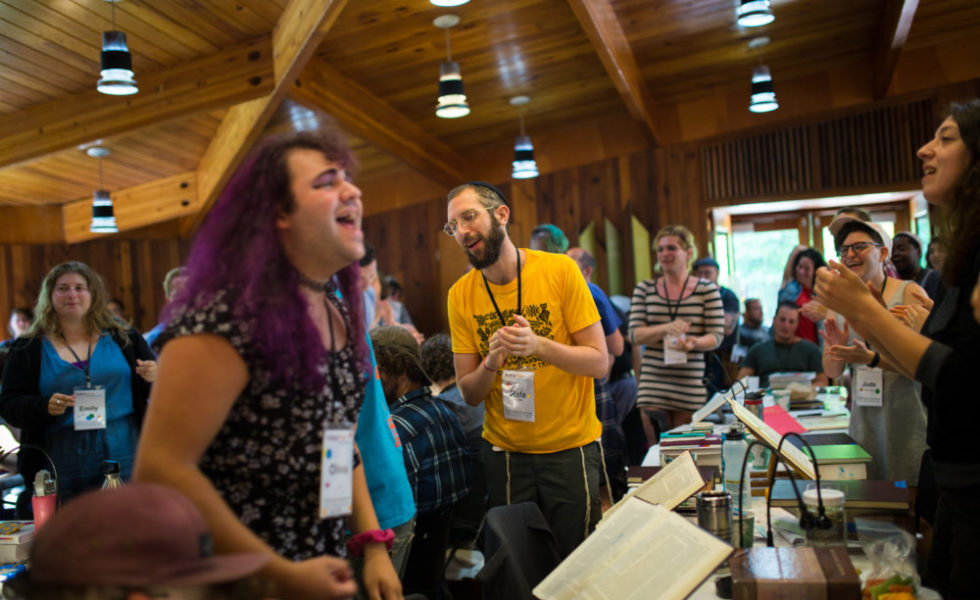Crash-Cycling from Simchat Torah into 5782

by R’ Bronwen Mullin, SVARA faculty
In song and dance we round up the High Holy Days with Simchat Torah, the day in which we honor the completion of the yearly cycle of reading the Torah (the Five Books of Moses, that is) in our communities, and then we start it all over again from the very beginning. It feels appropriate that we’re singing and dancing at this moment. It reminds me of what Rashi said about the womyn who left their slavery in Egypt with timbrels—that because the womyn knew there would be a miracle to celebrate this all the Israelites were redeemed. Adrienne Maree Brown had it right— “There is no way to repress pleasure and expect liberation, satisfaction, or joy.” And Susan Sontag, too —“If there’s no dancing at the revolution, then I’m not coming.” May Simchat Torah, the Pleasure of Torah, invite and ignite our revolutions again and again.
It also feels appropriate that just as we’re rounding the corner of those last days of Sukkot that flow into Simchat Torah, we read from Kohelet (The Book of Ecclesiastes). Read in the midst of the holiday where we dwell in fragile temporary dwellings, Kohelet forces us to examine and question the structures that inform so much of our lives—economics, education, privilege, oppression and violence, time, the fate of humans, free will, and the Divine plan if there is one (and if there is one, will there ever be anything new under the sun?). In truly Jewish fashion before the joy of Simchat Torah we find the turmoil of inner questioning and the displacement of self that comes from questioning our basic assumptions (think: Master-Story-Crashing-Fest). Like, it’s just so damn Jewish, right? But why are we always doing this to ourselves? Why are we actually forcing ourselves to encounter crashing master narratives as part of our holiest season?
Well, here’s something fantastic—our fairy-queen-stardust-covered-queer-rabbi-ancestors really couldn’t. Like, they just couldn’t with Kohelet. So much so that they dropped this:
בקשו חכמים לגנוז ספר קהלת מפני שדבריו סותרין זה את זה
(Babylonian Talmud Shabbat 30b)
The wise ones desired to suppress (lignoz) the Book of Kohelet because its words contradict (sotrin) each other.
Now you know we have to inside/outside these two words (it’s like the ultimate grammar-nerd-hakafah, just circling and circling till we get dizzy-deep in these Hebrantics J ):
ג–נ–ז
to cut off, set aside, to save, hoard up, reserve, to remove from sight, [and then eventually] to hide in order to prevent desecration, to declare a book apocryphal, to suppress, to prohibit the reading of
With this root found in the infinitive form (the Lamed prefix and the Vav infix indicating this), it seems the wise-ones actually felt that Kohelet should be cut off or maybe reserved for a later time. Or maybe it was supposed to be suppressed altogether. They were not feeling ready to handle it, but why?
ס–ת–ר
To hide, conceal, and eventually—to upset, tear down, disprove.
With the Yud Nun suffix, it seems our ancestors felt that the words themselves hid or concealed each other, or even tore each other down, disproving one another. So maybe these fairy-rabbis felt that this was a text that caused too much trouble, that left you with more questions than answers. But from so much else that we’ve seen, doesn’t it seem like our stardusty sugya-slaying zheroes love the hard questions? Maybe they felt that ultimately the questions that Kohelet was asking were not designed to build up and build stronger, but to upset and tear down.
So then how is it that we ended up having Kohelet not only in the canon, but as part of the freakin’ Holy Days themselves?? Check the next part of Shabbat 30b:
ומפני מה לא גנזוהו? מפני שתחילתו דברי תורה וסופו דברי תורה
And for what reason did they not suppress it? Because its beginning are words of Torah and its end are words of Torah.
I know, I know. You’re gonna tell me that you already know what Torah means, but look, we never really know what Torah means—that’s why we got the whole SVARA mishpocha (family) and thank-freakin-G@deSs, am I right?
ירה/ירי
To permeate, to penetrate, to shoot forth
The word “Torah” is a noun form of the hif’il version of this root, (and I know this from the Taf in the first position and the dropped Yud that became an ‘Oh’ vowel—these two things indicate that something is going on hif’il- style J ). So “Torah” is something that “causes permeation, causes penetration, causes to shoot forth” (I see you, you naughty little Talmud students you, get your minds out of that glittery gutter….)
But here’s the point—the whole purpose of Torah is that it gets us to go deeper and that it makes us more creative and resilient for when, inevitably, a new master story in our lives crashes. So every year as we round out another cycle of Torah reading and learning in community, we come face-to-face with the ways that maybe all the master stories we learn are like Sukkot (pl. of Sukkah)—they’re meant to be temporary, and if we look at them closely enough, we can see the glimmer of stars in the distance, aware that the shelter of this story doesn’t contain the whole picture. And maybe we read Kohelet just a few mere hours before we’re celebrating an end that is also a beginning—because as queer people it is written on our bodies and hearts that that which is sometimes hidden and sometimes contradictory can, again and again, turn an end into a radically glistening new beginning. May it be so.
 SVARA: A Traditionally Radical Yeshiva
SVARA: A Traditionally Radical Yeshiva